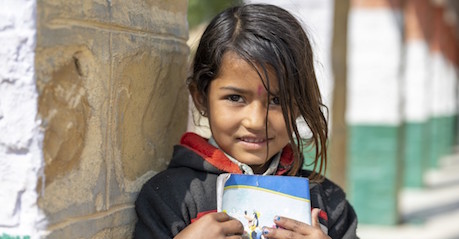COVID-related school closures disrupted the educations of more than half of all students worldwide, cutting them off from their studies, teachers, friends and vital school-based services, jeopardizing their learning, development and future.
For some — particularly girls — the break could be permanent. It is estimated that more than 10 million girls who were previously enrolled in school before the start of the pandemic may never return to the classroom. UNICEF is working to remove the barriers that prevent girls from getting the education they need to reach their full potential.
The pandemic is pushing more families into poverty, forcing girls to leave school behind for work or early marriage
For the first time in 25 years, worldwide poverty rates are on the rise. More poverty means more girls are being forced to drop out of school to work, get married or care for younger siblings and sick family members.
UNICEF works with partners around the world to support the reopening of schools and to prevent child marriage, early pregnancy and child labor. Girls who receive an education earn higher incomes, participate in the decisions that most affect them and build better futures for themselves and their families.
Early marriage robs girls of their childhood and their future
“I had many of my friends that were married off at an early age during the COVID-19 outbreak that led to school closure,” says 13-year-old Maryann, above, a student at Saka Boarding Primary School in Kenya’s Coast province. “Right now, the number of girls coming back to school has increased. As a school, UNICEF has helped us with learning materials and for those of us who are boarding, we have benefited from beddings for our hostels.”
Girls whose families rely on them for household chores like fetching water miss out on learning
The pandemic is also adding to the unequal burden many girls bear. Girls already do more chores than boys, shouldering caretaking responsibilities and walking long distances to bring home their family’s daily water supply.
“Fetching water has really affected my studies,” says 13-year-old Uzzaya, above, who lives in northeast Nigeria’s Bauchi state. “Most of the time, by the time I get back, lessons have already started. And sometimes, by the time I get to school, it’s already break time. If I didn’t have to fetch water every morning, I would be on time to school. I would have time to visit my relatives and even some time for myself.”
Working with partners, UNICEF is improving access to safe water in remote communities around the world, so girls can get to class on time.
Learn more about UNICEF’s work to keep girls in school:
School is often the only point of contact for child protection, mental health care and nutritious meals
“Education is not just a right — it’s also a lifeline,” UNICEF Executive Director Catherine Russell said on a recent visit to a school for girls in Islamabad, Pakistan.
For many children, school is a safe haven away from stress and abuse. Relationships with teachers and classmates may be the only healthy relationships they have. Schools not only nourish a child’s social and emotional well-being, they also provide the main meal of the day for 350 million children. UNICEF is working closely with local governments to ensure that all girls return to school so they can resume learning, play with friends again and receive the support they need to grow up healthy, with hope for a brighter future.
Support UNICEF’s work to keep girls in school so they can move forward in the direction of their dreams. Please donate.
The bipartisan Keeping Girls in School Act is designed to harness the power of U.S. Government to address the barriers that prevent girls from getting an education. Urge your Members of Congress to support legislation that empowers girls around the world.
Top photo: A young student holds one of her notebooks outside her school in the village of Rohidi, Barmer district, Rajasthan, India. © UNICEF/UN0594916/Panjwan. Video edited by Tong Su for UNICEF USA.
